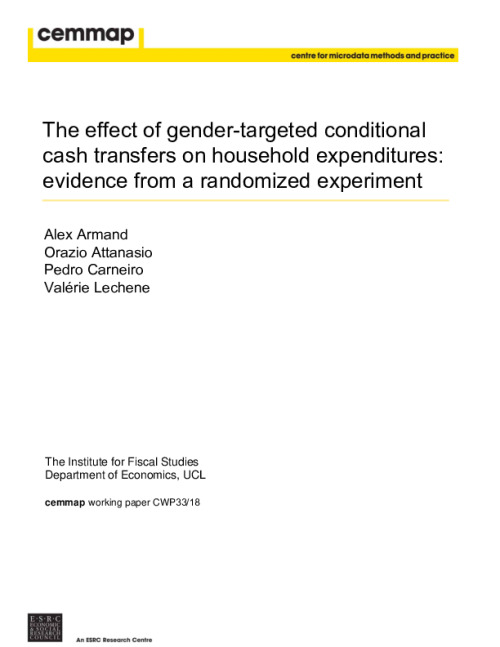Downloads

CWP331818.pdf
PDF | 3.51 MB
This paper studies the differential effect of targeting cash transfers to men or women on the structure of household expenditures on non-durables. We study a policy intervention in the Republic of Macedonia, offering cash transfers to poor households, conditional on having their children attending secondary school. The recipient of the transfer is randomized across municipalities, with payments targeted to either the mother or the father of the child. We show that the gender of the recipient has an effect on the structure of expenditure shares. Targeting transfers to women increases the expenditure share on food by about 4 to 5 percentage points. At low levels of food expenditure, we observe a shift towards a more nutritious diet as a result of targeting women.
Authors

CPP Co-Director
Orazio is an International Research Fellow at the IFS, a Professor at Yale and a Research Associate at the National Bureau of Economic Research.

Research Fellow University College London
Pedro is a Professor of Economics at University College London and an economist in the IFS' Centre for Microdata Methods and Practice (cemmap).

Research Fellow University College London
Valerie, a Research Fellow of the IFS, is a Reader at the University College London, whose research is focused on modelling intra-household behaviour.

Research Fellow Nova School of Business and Economics
Alex is an IFS Research Fellow, an Associate Professor at Nova School of Business and Economics and a Research Affiliate at the CEPR.
Working Paper details
- DOI
- 10.1920/wp.cem.2018.3318
- Publisher
- The IFS
Suggested citation
Armand, A et al. (2018). The effect of gender-targeted conditional cash transfers on household expenditures: evidence from a randomized experiment. London: The IFS. Available at: https://ifs.org.uk/publications/effect-gender-targeted-conditional-cash-transfers-household-expenditures-evidence-0 (accessed: 2 May 2024).
More from IFS
Understand this issue

Cutting inheritance tax isn’t quite as simple as its proponents suggest
20 November 2023

If you can’t see it, you can’t be it: role models influence female junior doctors’ choice of medical specialty
24 April 2024

A mess has been made of Child Benefit, and the clear-up operation may not be easy
29 March 2024
Policy analysis

Recent trends in and the outlook for health-related benefits
19 April 2024

4.2 million working-age people now claiming health-related benefits, could rise by 30% by the end of the decade
19 April 2024

Recent trends in public sector pay
26 March 2024
Academic research

A senior doctor like me: Gender match and occupational choice
24 April 2024

Imagine your life at 25: Gender conformity and later-life outcomes
24 April 2024

Labour market inequality and the changing life cycle profile of male and female wages
15 April 2024